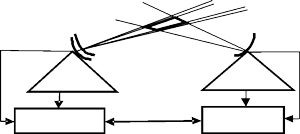Adaptive digital modem for tropospheric scatter link with two different communication stations
DOI:
https://doi.org/10.3103/S0735272721090065Keywords:
adaptive radio interferometer, troposcatter digital stations, adaptive transmitters, adaptive receivers, adaptive troposcatter modemAbstract
The joint operation of two troposcatter digital stations (TSDS) of different modifications can be implemented quickly through an adaptive signal control in stations at the same time. Such control can be organized with the help of an adaptive simulation algorithm for tropospheric scatter link (TSL) by using TSDS1,2 and controlling the signals at the output and input of adaptive antennas (AdA), adaptive transmitters (AdT), and adaptive receivers (AdR) in each station. We used a modern digital troposcatter modem (DTM) of one station and adaptive signal processing based on a digital special-purpose control unit (DSCU) of another station. As a result, the adaptive signal control stabilizes the levels of tropospheric signals in both stations at the same time, which provides the regular information reliability of TSL with TSDS of different modifications in their joint work.
References
- V. I. Rudakov, A. Y. Gupalo, A. N. Bychkov, “Adaptive control of the signal at the output of adaptive antenna in digital channel of troposphere communication,” in 2015 International Conference on Antenna Theory and Techniques (ICATT), 2015, pp. 1–3, doi: https://doi.org/10.1109/ICATT.2015.7136827.
- Y. S. Shifrin, Statistical Antenna Theory. Golem Press, 1971.
- V. G. Repin, G. P. Tartakovskii, Statistical Synthesis on Condition of A Priori Uncertainty and Adaptation of Information Systems, [in Russian]. Moscow: Sov. Radio, 1977.
- V. I. Rudakov, “Adaptive control of sensitivity receiver is probared by troposphere focal mancha of adaptive antenna,” Electron. Control Syst., vol. 3, no. 33, pp. 13–27, 2012, doi: https://doi.org/10.18372/1990-5548.33.5486.
- O. Sukharevsky, V. Vasilets, V. Misailov, “Calculation method of electromagnetic waves scattering by dielectric toroid meteorological formations,” Radioelectron. Commun. Syst., vol. 63, no. 11, pp. 596–605, 2020, doi: https://doi.org/10.3103/S0735272720110047.
- H. Pievtsov et al., “Development of an advanced method of finding solutions for neuro-fuzzy expert systems of analysis of the radioelectronic situation,” EUREKA Phys. Eng., vol. 4, pp. 78–89, 2020, doi: https://doi.org/10.21303/2461-4262.2020.001353.
- V. I. Solodovnyk, M. I. Naumenko, “Space-frequency block coding with two-mode index modulation OFDM and increased stability to channel frequency selectivity,” Radioelectron. Commun. Syst., vol. 63, no. 4, pp. 186–200, 2020, doi: https://doi.org/10.3103/S0735272720040020.
- P. Zuiev et al., “Development of complex methodology of processing heterogeneous data in intelligent decision support systems,” Eastern-European J. Enterp. Technol., vol. 4, no. 9 (106), pp. 14–23, 2020, doi: https://doi.org/10.15587/1729-4061.2020.208554.
- Q. A. Mahdi et al., “Development of estimation and forecasting method in intelligent decision support systems,” Eastern-European J. Enterp. Technol., vol. 3, no. 9(111), pp. 51–62, 2021, doi: https://doi.org/10.15587/1729-4061.2021.232718.
- N. Kuchuk, A. Mohammed, A. Shyshatskyi, O. Nalapko, “The method of improving the efficiency of routes selection in networks of connection with the possibility of self-organization,” Int. J. Adv. Trends Comput. Іcience Eng., vol. 8, no. 1–2, pp. 1–6, 2019, uri: http://www.warse.org/IJATCSE/static/pdf/file/ijatcse01812sl2019.pdf.
- O. Nalapko et al., “Development of a method of adaptive control of military radio network parameters,” Eastern-European J. Enterp. Technol., vol. 1, no. 9 (109), pp. 18–32, 2021, doi: https://doi.org/10.15587/1729-4061.2021.225331.


